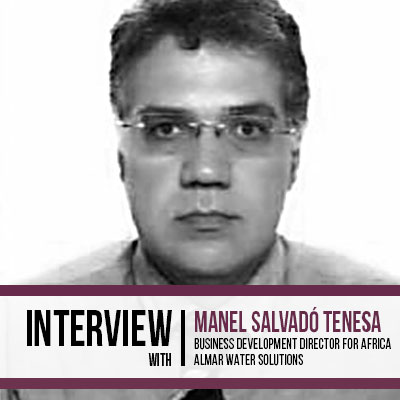
Manel Salvadó Tenesa is currently the Business Development Director for Africa at Almar Water Solutions. He holds more than 20 years of experience in the water sector, having participated in several water projects in Africa. He will be speaking at Africa PPP 2018, which will be held 24 – 25 October 2018 in Cape Town, South Africa.
Almar Water Solutions is a provider of specialist expertise and solutions in water infrastructure development, including financing, design and operation. Almar Water Solutions offers consultancy and designed project schemes specifically tailored to optimize the unique requirements of each situation, specially. PPP developed projects, following the national legislation of the country.
With a solid financial standing and benefiting from the strong networks and long-established relationships of Abdul Latif Jameel, Almar Water Solutions tackles the challenges of water scarcity, quality and contamination from a uniquely holistic perspective.
Almar Water Solutions is currently developing a desalination project that will supply the county of Mombasa, in Kenya. The project, with an estimated total capacity of 100.000 m3/d. Almar Water Solutions will be responsible for the financing, design, engineering, and later operation and maintenance of the plants, supervising the entire process from the beginning stages until the project is transferred to the client. The project, which will be developed under a DBOT scheme (Design-Build-Operate-Transfer), will be able to supply a population of over a million and a half people and will use the most efficient technologies available on the market.
Until two decades ago, projects related to water were the exclusive domain of governments and virtually all the infrastructure were tendered under the D&B or EPC models charged to the state budget. However, by 2015 between 15 and 18% of all water projects were developed under the PPP model. Nowadays will be more.
The main advantage of public-private partnerships is the sharing of human, financial and technical resources that enables the ideal allocation, since the responsibility is allotted to the entity best fitted to implement the project, with positive repercussion on both efficiency and costs. Wider experience in management and operations are made available to the project since it is tackled by companies with experience in the specific sector that compete on the market.
Africa is one of the geographical areas in which Almar Water Solutions is operating and where it has a special interest in developing innovative technological water projects to supply both the municipal and industrial sectors in the area. It is a region that poses challenges in the water industry due to its population growth, advances in economic development and the effects of climate change.
Our strategy with regards to the African market is:
– Be flexible and develop water infrastructures under project finance model, greenfield and brownfield projects.
– More support to the local authorities to give them confidence for developing PPP projects.
– Establish alliances with other developers to share projects but controlling risks.
– Work with the local financial system.
– Deep collaboration with multilateral financial structures.
– New ideas for improving PPP legislation;
– An increased interest from local and national governments in the potential of private finance;
– Expand the coverage of drinking water and wastewater services with the help of private funding;
– More attention to water reuse;
– Networking opportunities with local partners, companies and decision makers.